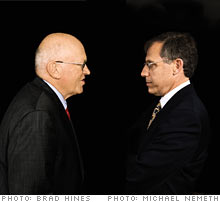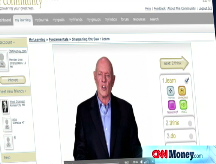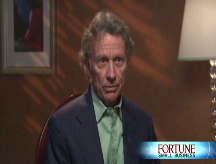Want to start a biz? Here's what matters
Two leading authors offer starkly different perspectives on the great American pastime: starting a business.
 |
| Ken Blanchard (left) and Scott Shane |

(Fortune Small Business) -- You've heard the conventional wisdom: Entrepreneurs drive innovation and job creation in the U.S. Yet two recently published books draw starkly different conclusions about the state of small business in America today.
In The One Minute Entrepreneur, motivational speaker and author Ken Blanchard uses a thinly disguised version of his life story to offer lessons and inspiration to aspiring business owners. On the flip side, Scott Shane, a Case Western University professor of entrepreneurial studies, presents a more skeptical, statistically grounded view of startup life in The Illusions of Entrepreneurship. Recently Fortune Small Business sat down with the two authors for a conversation on the future of small business.
FSB: It's been said that we're living through the most entrepreneurial period in American history. Care to comment?
KEN BLANCHARD: In the near future, the growth in jobs won't be coming from Fortune 500 companies but from small, entrepreneurial firms. There are two big populations interested in entrepreneurship.
The first is young people, the Y generation. They've seen their parents be loyal corporate workers and be downsized and right-sized and outsized. The other group is the baby-boomers. They're being told that they should retire, but if they retire they'll die. So they're starting companies.
SCOTT SHANE: The stats don't support this idea of a huge entrepreneurial surge in the U.S. In fact, a shrinking proportion of the American population run their own businesses. I call this the Wal-Mart (WAL) effect. The growth of huge, technologically advanced companies like Wal-Mart has decreased the number of small businesses that can survive. The huge firms are so efficient, it's hard to compete. It's almost like you might as well work for them.
KB: I agree that the Wal-Marts have had an impact. But, for example, in our town there's a small hardware store. I asked the owner what effect Wal-Mart has had, and he says he's too busy to worry about it. Really, I think Wal-Mart puts lousy businesses out of business.
SS: The numbers show a rise in people who would like to work for themselves. A larger percentage of the population want to start their own businesses, but a smaller percentage are actually doing it.
FSB: We celebrate the small-business life in every issue of FSB. But is entrepreneurship good for society?
SS: From a societal point of view, if you have a group of people who do something that makes them happier but less productive (which the data support), and you aggregate that, then entrepreneurship is an economic drain. If the goal of the policymaker is to make everybody in your country happy, then let everybody start businesses.
But most policymakers seek to create jobs and promote growth. If that's your goal, you want to stop all these people from starting marginal businesses that don't go anywhere and devote the resources to encouraging high-growth companies. In terms of tax policy, for example, you could argue that the government should eliminate the home-office tax deduction - which doesn't differentiate between high- and low-performing businesses - and beef up R&D tax credits.
Knowledge-based businesses tend to do better and generate more productivity than other startups, so you'd end up with fewer businesses but more high-growth startups. For job creation you should be less concerned with how many new businesses there are than with how many good ones are being started.
KB: I'm much more in the dream-making business. I think a dream is a goal with a deadline. I think the great competitive edge of America is free enterprise and the opportunity to be your best and to seek a living that excites you.
I agree with Scott that we want to be really careful and don't want to encourage failure. If we're going to encourage people to start businesses, we need to be there to help them, whether it's with retired executives who mentor or whatnot. I think we need to say to people, "Don't take entrepreneurship lightly."
FSB: Scott, your book suggests that entrepreneurs do best when they're in it for the money. Is that true?
SS: It's not so much that starting a business for the money makes you more successful. It's more that starting a business for the reason most people do - because they don't want to have a boss - is a bad reason. Often people don't want a boss because they don't want to be told what to do. But your customers often tell you what to do, and if you don't want to listen to anyone, you probably won't listen to your customers.
FSB: What's the best way to differentiate your new business from the competition?
KB: In the book I mention Jan Carlzon of Scandinavian Airlines. He went all over Europe and said, "We're going to be the No. 1 business airline in Europe. We're not going to do that by having good airplanes, because if you don't have good airplanes, you're not in the game. We're not going to beat the competition on price, because we don't want to get into a price war with bigger competitors. Instead we're going to beat them on 'moments of truth,' which happen anytime a customer comes into contact with an employee."
SS: The data show that startups typically try to compete on price. But pricing competition is not the most successful way to compete. In fact it's one of the worst ways. You can't compete on price if you can't compete on cost. And if you're starting small, you're rarely going to have a cost advantage.
FSB: How important is external financing?
KB: Sales need to exceed expenses. A lot of startups want fancy stationery and an office, even though they don't have customers. So, yeah, we were self-financed, but we brought five prominent entrepreneurs onto our advisory board who said they would get us work. We didn't ask them for money. Instead they sent us customers, who were money.
SS: Being adequately financed affects success. Many businesses fail because they are undercapitalized. And getting someone else to put in money is a lot harder than getting yourself to do so. So externally financed startups tend to do better because they are better: They came up with a better idea, and they've passed a more rigorous screen.
FSB: What's the most important factor in determining who will be an entrepreneur: demographics or personality?
SS: People like to think entrepreneurs are special. But demography matters much more than mental makeup.
For example, white Americans are three times more likely to start businesses than black Americans are. And that's been pretty much the same since 1910. So what's going on here? If you measure psychological characteristics of representative samples of whites and blacks, you see very little difference.
The main difference between white and black households is net worth. White household net worth is 10 times that of black households on average. Now, most U.S. startups are self-financed. Entrepreneurs with 10 times more money take on less risk because they invest a much smaller percentage of their net worth when starting a business. So until you get rid of household wealth discrepancy, you'll see that gap there.
KB: Forget sex and color: Entrepreneurship is all about fire in the belly.
I spent time recently with Magic Johnson. He told me that he got interested in business even before he started playing basketball. In high school Johnson worked on an office-cleaning crew to make money. He always volunteered to clean the CEO's office - his co-workers avoided those offices because they were bigger. While Johnson was in there cleaning, he would shut the door, push the intercom and say: "Mrs. Jones, bring me a cup of coffee." He just had that fire in the belly early on. ![]()
The 4-hour work week
Study: Men twice as likely to start a business
Ask FSB: Startup tips
-
The Cheesecake Factory created smaller portions to survive the downturn. Play
-
A breeder of award-winning marijuana seeds is following the money and heading to the U.S. More
-
Most small businesses die within five years, but Amish businesses have a survival rate north of 90%. More
-
The 10 most popular franchise brands over the past decade -- and their failure rates. More
-
These firms are the last left in America making iconic products now in their twilight. More










